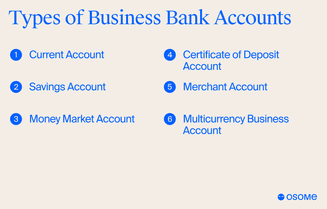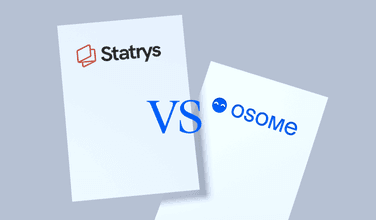Ultimate Guide to Choosing the Best Business Account
- Modified: 18 July 2025
- 11 min read
- Grow Your Business


Gabi Bellairs-Lombard
Author
Gabi creates content that inspires. She's spent her career writing compelling website copy, and now she specialises in product marketing copy. As the voice of our products and features, Gabi makes complex business finance and accounting topics easy to understand. Her top priority is ensuring that her words impact and inspire her readers.
Business accounts can significantly impact your company's financial well-being. Appropriate business account structures will simplify your company's finances, whereas a poorly structured account can pose threats to your company's cash flow, operation, and legal compliance. Having your business accounts in order also provides you with critical business insights that can aid in key decision-making, such as incorporation readiness, fundraising needs, and risk tolerance. In this article, we will go through the most common types of business accounts in Hong Kong, the top financial institutions you can bank with, and how to open a business account in Hong Kong.
Key Takeaways
- Common business account options include integrated business account, multi currency savings account, time deposit account, and business line of credit. Each has different deposit nad withdrawal requirements, interest rates, account opening fees, benefits, and restrictions.
- Required documents to open a business account in Hong Kong include company information, personal information, and authorised signatories. Many banks offer remote account opening and online banking services to streamline the process.
- Keep your personal and business finances separate. This creates stronger legal protection over your private assets. However, your personal account can be from the same bank so you can take care of all your financial needs in one place.
Different Types of Business Accounts
Your business account must meet your company's financial requirements, including routine transactions, funding availabilities, space for fiscal expansion, and compliance needs. There are six major business account categories in the Hong Kong market: business checking, business savings or certificate of deposits (CDs), money market, foreign exchange or multi-currency accounts, business integrated accounts, and merchant accounts.
Get your business up and running with ease through our expert company registration and business bank account opening services. Our dedicated team simplifies the process, handling all the paperwork and legal requirements so you can focus on your vision. Contact us today!

Business Checking
This is the business account for regular business transactions, including deposits, withdrawals, payments, and transfers. Most banks in Hong Kong allow you to access your business account online. You can find checking account options from traditional banks or credit unions.
A business checking also simplifies your business financial management and provides ensured regular access to your funds. It also makes receiving a small business loan easier since most organisations prefer to deposit the funds into a checking account directly. Many banks also offer a discounted or zero account opening fee if you can start with a certain amount of funds in your company's business account.
Business savings, CDs, and money market accounts (MMAs)
A higher interest rate is mainly why some businesses would opt for a savings account. You can choose between a high-yield (HYD) saving, a certificate of deposit (CD), or a money market account (MMA). These accounts benefit your future financial growth and can serve as emergency funds.
CDs allow businesses to put money aside for a set period and receive higher interest rates. These term accounts are great choices for businesses that are doing well and can comfortably lock a portion of their funds away. Meanwhile, HYDs offer a higher rate but still give you flexible access to funds via corporate cards. Finally, MMAs are great options for companies with a large cash reserve.
Business Integrated Accounts
A Business Integrated Account provides unified banking services for companies and handles various financial needs in one place, including savings, foreign exchange, multi currency time deposit, and day-to-day banking transactions. It streamlines your company's financial operation and makes banking easier and more manageable.
Many banking institutions offer business integrated accounts. One great example is the HSBC Sprint Account. An HSBC Sprint Account provides integrated business solutions for small-scale startups and mid-sized businesses, allowing a company to manage all their banking needs in one place. Another popular HSBC business integrated account is HSBC Business Direct. Designed for new businesses, this business integrated account offers a free payroll service setup, 247/7 online access, and a welcome cash rebate.
Merchant Accounts
Companies with large transaction volumes can significantly benefit from the maximum cash rebate offered by merchant accounts. This type of cash rebate subsidies the 3-4% transaction fees banks charge to process credit and debit card payments, making it part of the cost paid by the customer instead of an additional expense the company must afford. The cash rebate then allows businesses to continue accepting major credit and debit cards without suffering from the extra transaction fee.
| Account Type | Main Purpose | Key Features |
| Business Checking 🏦 | Daily transactions | Deposits, payments, transfers; online access; may ease loan approval |
| Business Savings / HYD 💰 | Growing reserves with interest | Higher interest than checking; flexible access; ideal for future growth |
| Certificates of Deposit (CDs) 📄 | Earning fixed interest over time | Locked funds for a term; higher return; good for stable businesses |
| Money Market Account (MMA) 💹 | Holding large reserves securely | High interest; access to funds; best for businesses with strong cash positions |
| Business Integrated Account 🔄 | Unified management of all banking needs | Combines checking, savings, FX, payroll; streamlines finance (e.g. HSBC Sprint) |
| Merchant Account 💳 | Handling card payments and reducing fees | Accepts credit/debit cards; cash rebate offsets processing fees |
How To Open a Business Account in Hong Kong
Opening a business account in Hong Kong can be simple if you have all the required documents gathered beforehand. If you need help with account opening, talk to a Hong Kong business accountant at Osome, or simply let us take over the entire process.

Preparing Your Company Details and Documents
Opening a business account in Hong Kong begins with providing documents to validate a company's legal status and identity, including submitting the Business Registration Certificate (BR) or Certificate of Incorporation (CI) to the Shareholder Register. If your company is incorporated, you must provide a custom tailor-made Opening Documents Package to open a business account. This package often include business formation records, incorporation documents, any registered service mark or trademarks, and previous tax filing and compliance documentation.
KYC and compliance procedures
Know Your Customer (KYC) regulations are crucial to opening a business account. They help establish the clients' identity, ensure all required documents are submitted to meet the Anti-Money Laundering and Counter-Terrorist Financing Ordinance criteria, and hence protect institutions and consumers from fraudulent behaviour and unlawful acts. As part of the business account opening procedure, companies must submit identity-validating documentations such as their Social Security number and an Employer Identification Number (EIN).
Separating Personal and Business Finances
Keeping your personal accounts separate from your business can protect your personal assets from business-related liabilities. It also keeps you compliant with many legal and regulatory standards in Hong Kong. For example, keeping your personal accounts separate simplifies your business bookkeeping needs and also helps you identify potential tax deductions.
Business Banking Services Through Online Platforms
Nowadays, the account opening process in Hong Kong for businesses of any size can be handled online via business banking services. Technological advancements have allowed virtual banks to create a secure and proven online process that meets various business financial needs.
Opening a business account online through a virtual bank often begins with downloading the bank's mobile app, such as the DBS IDEAL Mobile app. The app then takes you to the online application page, which usually contains various digital forms. Then, the bank will need to verify your identity online, which can be done via a 3D facial scan, uploading your government-issued ID, or a video chat with one of the banking representatives.
Once all procedures are complete, you will pay the required business account opening fee or make the initial deposit. And voila, you are now ready to manage the money side of your company's operations without leaving the comfort of your home office.
On the other hand, if you prefer in-person interaction, you might prefer working directly with many well-established traditional banks in Hong Kong, such as Hang Seng Bank. The only downfall is you'll need to be physically present in Hong Kong until the business account opening procedure is complete. Some local banks also offer phone banking options, such as CBS phone banking. These options are the nice middle ground between fully virtual and and fully in-person.
SME Financing Guarantee Scheme and Business Financing
Administered by HKMC Insurance Limited, the Scheme helps small and medium-sized enterprises (SMEs) to obtain business loans from participating lenders. Those interested simply need to fill out the application form and provide all necessary supporting documents. Once approved, you pay the guarantee fee and then receive your loan.
Other financing options include traditional business loans and business lines of credit. Corporate cards issued by credit companies often provide cash rebate incentives, and allow you to access necessary funds in advance to make important purchases and investments for your businesses. Instead of a monthly fee, most business credit cards charge an annual membership fee plus monthly interest on past purchases.
Business Account Features for Enhanced Operations
Numerous functionalities are available in business bank accounts to improve the efficiency of business operations. Companies can manage dealings in different currencies and handle foreign exchange transactions through a unified platform with multi-currency business accounts, eliminating the necessity for individual accounts per country or currency area.
The advantages provided by these accounts include:
- Amalgamating various international financial activities and business expenses into one business account while reducing fees
- Decreasing conversion expenses and bolstering control over cash flows
- Advancing clarity while streamlining accounting and reporting procedures
- Easy tax returns filing with existing business transaction records
- Reducing mistakes and facilitating adherence to regulatory standards.
Faster payment system for efficient transactions
In the contemporary world of business, where speed and efficiency are key competitive advantages, a Faster Payment System (FPS) can be transformative. FPS facilitates quick payment processing – typically within minutes – which empowers businesses with the capability to execute and receive transfers on the same day.
Transactions processed through Faster Payments often have reduced costs compared to classic payment methods. This aspect makes it particularly beneficial for companies engaging in regular or low-value transactions. Robust security measures such as encryption and two-factor authentication are inherent in FPSs, ensuring that business dealings remain protected against fraudulent activities.
Integrating accounting software for financial oversight
Incorporating accounting software into your Hong Kong business account can greatly enhance a company's financial management. Platforms such as Osome offer comprehensive accounting solutions, enabling the safe consolidation of critical documents and facilitating the automation of bank statements, invoices, bills, and expense uploads for streamlined tax preparation.
For businesses operating in Hong Kong where annual audits by a certified third-party auditor are compulsory—and their findings must be reported to the Inland Revenue Department – an amalgamated banking and accounting system simplifies this mandatory procedure considerably. Additionally, it streamlines tax return filing with existing business transaction records, making compliance and financial reporting more efficient.
Comparing Fees and Minimum Deposit Requirements
Most banks in Hong Kong charges a different fee for domestic and international businesses. For example, Standard Chartered Hong Kong has an HK$ 1,200 account opening fee for domestic corporations and HK$ 10,000 for international firms.
Business accounts may also require a minimum deposit. Some might waive their monthly fees if your bank balance stays above a certain amount. Knowing these criteria will help you choose the most suitable bank account for your business.

Maximising Benefits with Business Account Perks
A business integrated account like Business Direct provides a handful of perks to account holders. Other business account types may provide monthly fee waivers and additional cash rebates. For example, companies registered may receive an initial account opening bonus with some institution, whereas a sole proprietorship is sometimes awarded more cash backs on purchases made under certain categories.
How To Open a Business Account Online?
The advent of virtual banking has simplified the account opening process, especially for business accounts. Businesses now have the convenience of initiating and completing their account openings entirely through online platforms offered by these digital banks. This modernised method greatly accelerates the procedure, often allowing businesses to open an account in just a few days.
To begin this streamlined business account opening process, one typically follows these steps:
- Initiating the download of a designated banking application
- Carefully complete an online application form provided within the app or platform
- Proceeding with digital ID verification measures
- Executing an electronic payment as part of the setup
A key element of this remote and efficient approach is digital ID verification—a vital phase where e-signatures are employed alongside Know Your Customer (KYC) procedures during calls to verify identity. This ensures that even though you’re operating remotely, your business’s security and legitimacy are thoroughly established throughout your new bank’s onboarding routine.
Choosing the Right Bank for Your Business Needs
Not all banks are made the same and the bank you choose can make or break your business. Here are a few questions to ask yourself before making that choice:
- What are my company's banking needs?
- How much are the monthly fees, and can I waive it somehow?
- Is online business banking an option?
- Is this institution well established, trustworthy, and vetted for its customer support?
For example, Bank of China Hong Kong is one of the most authoritarian financial institutions. However, it has a much higher business account opening and monthly fees compared to other options and their online bank opening system only works with Hong Kong businesses. That said, it may not be the best option for an international entrepreneur with a small business or a startup.
Adapting to the Global Finance
If companies want to grow into global enterprises, they must be able to receive global payments and process foreign currencies. Therefore, it's fundamental to have a company's business account that handles multiple currencies. Many financial institutions also offer easy foreign exchange services that can be done over a mobile app, making handling foreign currencies effortless for most companies.
Accounts allowing foreign currencies allow a company to merge international transfers and business expenses into a singular account. This minimises your transaction fees, reduces the cost of foreign exchange, improves cash flow management, and keeps you compliant with regulatory standards. Therefore, we highly recommend you open a business integrated account with multi-currency capabilities.
Choosing a Business Bank Account
Your business structure will help you determine if a certain business account is suitable for your needs. For example, sole proprietors can benefit from accounts with elevated transaction limits and treasury management resources. However, they may not be able to benefit from an account with a large upfront deposit requirement or a higher monthly fee. On the other hand, limited companies have much more comprehensive banking needs. Therefore, a business integrated account with robust capabilities to handle different types of transactions on demand is often their best choice.
Summary
Choosing the right business accounts is essential for your company's growth. Most companies in Hong Kong opt for a business integrated account that pulls daily transactions, business expenses, cash flow management, financing, saving, and even payroll services into one place.






